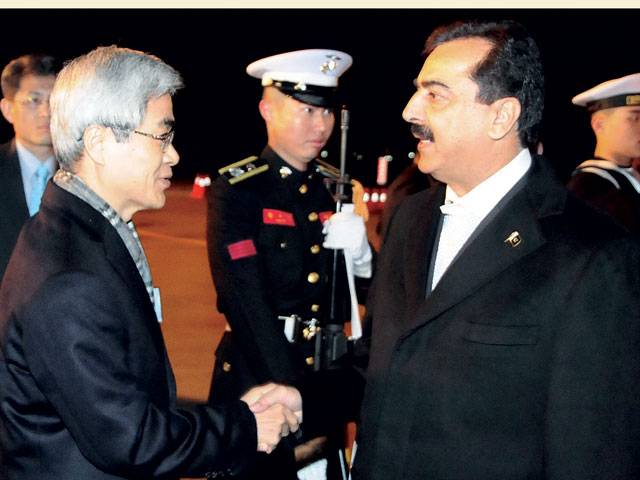ISLAMABAD - Prime Minister Yousuf Raza Gilani has assured that a decision about reopening of Nato supply route will be taken after a parliamentary consensus.
Talking to media persons here Sunday morning before his departure to Seoul to represent Pakistan at the second nuclear security summit, the prime minister pointed out that government stopped Nato supply on its own initiative and not on a demand from the opposition; and now, the decision to resume it would be taken by the parliament.
“The recommendations made by the parliamentary committee on the national security were not made by us or our government (alone)… All political parties - including those in the opposition – participated in its preparation and gave their proposals; and they have their signatures (on the PCNC draft); how could they expect then that we will bulldoze the parliament?“
Gilani said that several peaces of legislation, including different amendments and resolutions, have been passed by the parliament with the consensus of the opposition and the government seeks unity on this issue as well.
He however said that on the first day of the DCC meeting, the government decided to stop the Nato supply, then the opposition should give its credit to the government. He said the government also took the decision to boycott the Bonn Conference and to vacate the Shamsi airbase. PM Gilani said in his meeting with US President Barack Obama, on the sidelines of the summit, he would discuss bilateral matters and the situation in Afghanistan. The talks at Seoul will mainly focus on how to further protect the nuclear weapons, he said, adding that it is a follow up meeting of the 2010 Washington summit to exchange notes on the efforts so far taken in this connection and how nuclear weapons could be protected effectively.
Gilani said Pakistan wants an access to civil nuclear technology which it desperately needs for development. A well-placed command and control system of country’s nuclear assets is in place and no one should have any doubt about it, he said. “We have already been demanding that we need civil nuclear technology and it is important to maintain a balance in the region.” He pointed out that India has been given access to the civil nuclear technology causing a nuclear imbalance and creating prospects of instability in the region. “We have been demanding civilian nuclear technology and will continue to do so until we get it, because it is our requirement.”
APP from Seoul adds: The prime minister arrived in Seoul, South Korea, for the four-day visit to attend second Nuclear Security Summit on March 26-27. Foreign Minister Hina Rabbani Khar and Pakistan’s Ambassador to the US Sherry Rehman are also accompanying the prime minister. The summit will be attended by representatives from 58 nations and four international organisations, including 45 heads of state.
In South Korean capital Seoul, Prime Minister Gilani stated the allegations that Islamabad helped North Korea in its nuclear programme were unfounded and represented a thing of the past.
In an interview with a Korean news agency, the premier said the matter has been investigated with Pakistan officially and he denied any Islamabad involvement in Pyongyang’s weapons programme. “There had been some disinformation and allegations in the past but now it is a closed chapter - that we have already denied,” Gilani stressed.
Gilani said that in the upcoming NSS gathering, there is a need for the world to come up with a strategy to safeguard fissile materials that can be used for weapons of mass destruction. The prime minister said his country has developed very effective command and control systems to protect nuclear materials, and will share this know-how in the future with the rest of the world. He said international cooperation is important because nuclear safety requires wide, concerted efforts by many countries.
Gilani, meanwhile, said that Pakistan has maintained excellent relations with South Korea since normalisation of diplomatic ties in 1983 and wants to expand economic cooperation. He asked for more South Korean investment in such areas and infrastructure building.
Saturday, April 20, 2024
No bulldozing of joint session: PM

Policitising Tragedy
April 20, 2024
Tehran to Rafah
April 20, 2024
A New Leaf
April 20, 2024
A Tense Neighbourhood
April 19, 2024
Dubai Underwater
April 19, 2024
Dangers of Deepfakes
April 20, 2024
Feudalism
April 20, 2024
Kite tragedy
April 19, 2024
Discipline dilemma
April 19, 2024
Urgent plea
April 19, 2024
ePaper - Nawaiwaqt
Advertisement
Nawaiwaqt Group | Copyright © 2024





